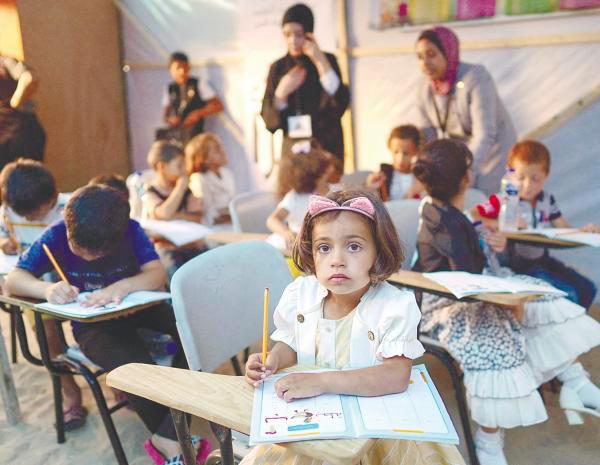MORE than six months have passed since the onset of conflict in Gaza, a period marked by devastating losses. Recent statistics indicate over 30,000 casualties, with a majority comprising women and children.
According to the United Nations Population Fund (UNFPA), approximately 1.7 million people in Gaza are currently displaced. This turmoil has not only shattered lives but has also led to the collapse of crucial infrastructures, including healthcare and education.
A report from the UN Children’s Fund (Unicef) and non-govrnmental organisation the Education Cluster and Save The Children revealed that approximately 212 schools out of 563 school buildings in Gaza have been targeted as of March while satellite imagery indicated that at least 53 schools have been destroyed.
The “assault” on education does not stop there. Universities in Gaza have also been targeted, causing significant losses to the academic community. At least 94 academics have lost their lives as a result.
In January, Al-Israa University, Gaza’s last operational university, was bombed. In just four months, all 12 universities in Gaza have been demolished, as reported by the Palestinian Education Ministry.
The bombings of these educational institutions have raised the question of whether there was a deliberate intent to dismantle Gaza’s entire education system.
The term “educide” was first coined in a book titled Cultural Cleansing in Iraq: Why Museums Were Looted, Libraries Burned and Academics Murdered published in 2010, merging the words “education” and “genocide”.
While the initial usage of the term was to question whether the systematic killing of Iraqi academics and intellectual elites could constitute a case of “educide”, the term has since been used to elucidate systematic decimation of a region’s educational framework during conflicts or invasions – which may rightly describe the situation in Gaza.
The consequences of such targeted destruction are profound and far-reaching, impacting not just the present academic operations but also future generations’ intellectual and societal landscape.
The consequences of educide in Gaza are not few. The loss of educational infrastructure and academic personnel has essentially paralysed universities in Gaza, thus disrupting the academic calendar indefinitely.
Planned examinations and other academic activities have been postponed or cancelled. Ideas, efforts and resources reserved for various academic activities have gone in vain.
As for academics and students who survived the bombings, they could be forced to migrate, which can worsen the intellectual drain from the region in the long run.
Furthermore, the ongoing instability will likely jeopardise their academic standards, with many research projects halted, and essential resources like libraries and laboratories destroyed.
We should not overlook the psychological toll this violence is taking on students and educators. The trauma associated with such loss can significantly impair their mental well-being, thereby affecting their educational and research capabilities.
It will also take a collective and exceptionally strong effort to support the demotivated and traumatised students to resume their academic journey once, and if, the conflict is over.
While the rest of the world has shifted to and embraced e-learning, this development is almost impossible to be achieved in Gaza due to the relentless bombings, instability of internet connection and lack of electricity.
The extensive damage to the educational system in Gaza could set the region back by decades, just like what happened in Iraq, significantly hindering its progress compared with the rest of the world.
The destruction of the education system is not just a casualty of war but a deliberate strategy aimed at crippling a society at its foundational level.
One thing worth noting is that despite decades of restrictions in Palestine, Palestinians in the occupied West Bank and Gaza aged 15 and above had a literacy rate of 97.8% as of 2022, as reported by the Palestinian Central Bureau of Statistics.
We must echo the spirit and resilience of the people in this region and help ensure that they receive equal access to education just as the rest of the students worldwide.
Let us all be ready to empower them in Gaza, to spearhead the reconstruction and revitalisation of their scarred communities to a brighter future.
I am reminded of the poignant words of Dr Refaat Alareer, a professor from the Islamic University of Gaza, who tragically lost his life in an Israeli airstrike last December: “Let it be hope, let it be a tale.”
The writer is a lecturer at the Department of Oral and Maxillofacial Clinical Sciences at the Faculty of Dentistry at Universiti Malaya. Comments: letters@thesundaily.com









